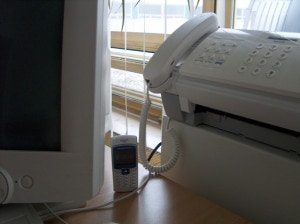January 5, 2018

On November 2, 2017, the United States District Court for the Northern District of Illinois (Leinenweber, J.) denied a motion to dismiss a class action fax lawsuit against Promologics, Inc. (d/b/a “Health-Scripts”), a healthcare company offering network opportunities, and Janssen Pharmaceuticals, Inc. (“Janssen”), a pharmaceutical company that markets a type 2 diabetes drug (collectively “Defendants”). Plaintiffs America’s Health & Resource Center and Affiliated Health Group, Ltd. (collectively “Plaintiffs”) alleged that Defendants violated the Telephone Consumer Protection Act (“TCPA”) by sending unsolicited marketing materials via telecopier without including the TCPA-mandated opt out notice. The case is captioned America’s Health & Res. Ctr., Ltd. v. Promologics, Inc., No. 1:16-cv-09281 (N.D. Ill. Nov. 2, 2017).
Why did the Court find that a Free Dinner Seminar Amounts to an “Unsolicited Advertisement?”
Free Dinner Seminars and the TCPA
According to the underlying fax lawsuit Complaint, on or about May 29, 2016, Defendants sent Plaintiffs a three-page fax, although not specifically addressed to either company. Instead, the subject fax was addressed to nurse practitioners and physician assistants, inviting them to a free educational dinner seminar that would discuss treatment options for adult patients with type 2 diabetes and identified the sponsor as Janssen. The accompanying RSVP form indicated that by submitting the form, the recipients would provide Health-Scripts with permission to use their personal information to send them offers and information from third party healthcare companies. The RSVP form also advised that permission could be revoked via email at any time. The fax lawsuit Complaint alleged that Defendants’ faxed invitation amounted to an “unsolicited advertisement” allowing Health-Scripts to collect and sell registrant data and Janssen to promote its medications at the dinner. Defendants, on the other hand, argued that the “fax at issue promoted only a free dinner seminar for certain healthcare professionals” and was not advertising a commercial product or service.
The TCPA and Junk Fax Protection Act regulations prohibit the sending of an “unsolicited advertisement” unless there is an established business relationship with the recipient or the fax recipient has otherwise provided prior express consent to receive such communications—neither of which were alleged to have been the case in the instant matter. The court observed that “[n]o statements on the fax specifically promote products or services commercially” from either Defendant. Nevertheless, the court found that Plaintiffs plausibly alleged that Defendants’ fax promoting a free dinner seminar was an “unsolicited advertisement” used as a backdoor tool to advertise commercial products and services, i.e., for Janssen to discuss its drugs and Health-Scripts to collect and share personal information.
Defendants’ Other Claims
In ruling for the Plaintiffs on the motion to dismiss, the court found that Plaintiffs had sufficiently put Defendants on notice of their TCPA claim by setting forth the date that they received the fax, who the fax was from, and attaching the subject fax and RSVP form. In addition, the court found that the “mere receipt of a fax alleged to lack TCPA opt-out notices constitutes sufficient harm for purposes of Article III standing.”
How to Avoid a Fax Lawsuit
While the court denied Defendants’ motion to dismiss the instant fax lawsuit, the court explained that the Defendants will have the opportunity during discovery to prove that they did not or would not have advertised their products or services at the free dinner seminar. The moral of the story: Describing a corporate dinner as a free industry seminar does not necessarily make it so from a TCPA perspective. As such, if your business sends communications via telecopier, it is important to take steps to ensure that your faxes comply with TCPA regulations.
If you are interested in learning more about this topic, please visit the Telemarketing Law practice area of our website. If you have been served with a TCPA lawsuit, please e-mail us at info@kleinmoynihan.com or call us at (212) 246-0900.
The material contained herein is provided for informational purposes only and is not legal advice, nor is it a substitute for obtaining legal advice from an attorney. Each situation is unique, and you should not act or rely on any information contained herein without seeking the advice of an experienced attorney.
Attorney Advertising
Similar blog posts:
Alarm.com Can’t Escape TCPA Lawsuit
App Provider Escapes TCPA Liability for User-Initiated Text Message Marketing



